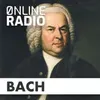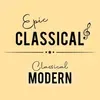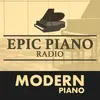Modern classical Live Radio Stations
Radio Stations
Choose a Genre
Modern Classical: A Fusion of Tradition and Innovation
The world of classical music has long been a domain of rich traditions, intricate structures, and time-honored techniques. However, as the world of music evolved, so too did the realm of classical composition. Emerging in the late 20th century, "modern classical" music combines the elegance and complexity of traditional classical music with the innovation and experimentation of contemporary styles. A genre that constantly challenges boundaries, modern classical music offers an exciting new frontier for both composers and listeners alike.
The Rise of Modern Classical: Breaking Tradition
At its core, modern classical music retains the essence of its classical roots—sophisticated orchestral arrangements, structured compositions, and a focus on musical craftsmanship. However, it diverges significantly from its traditional counterpart by incorporating new forms, structures, and techniques that reflect the changing musical landscape. In the hands of contemporary composers, classical music has become an arena for experimentation, embracing electronic and digital technologies, as well as exploring unconventional soundscapes.
The use of dissonance, unconventional harmonies, and the interplay of noise and melody characterizes modern classical music. Composers often create complex, layered pieces that draw from both classical traditions and modern innovations, crafting compositions that resonate with a broad spectrum of emotions. These works may be performed by traditional orchestras or use a variety of unconventional instruments, including synthesizers, manipulated sounds, and even voice samples.
Key Figures and Influences
Modern classical music draws from a diverse pool of influences, many of which emerge from the 20th century. Iconic composers like Philip Glass, John Cage, and Steve Reich are some of the pioneers who helped shape the genre into what it is today. Glass’s minimalistic, repetitive structures, Cage's exploration of chance and silence, and Reich's use of phasing and rhythmic patterns are foundational to the development of modern classical music. Their works, along with those of other composers, have provided the blueprint for a new wave of creativity that continues to flourish.
As technology advanced, composers began experimenting with electronic elements, integrating digital sound manipulation, loops, and computer-generated sounds into their compositions. This blend of acoustic and electronic elements is a hallmark of modern classical music, creating a dynamic, sometimes surreal listening experience that extends far beyond the confines of traditional orchestral music.
Modern Classical on the Airwaves
Radio stations dedicated to modern classical music provide a unique listening experience for those looking to explore the cutting-edge side of classical music. These stations often feature a mix of compositions by living composers as well as iconic works from modernist composers of the 20th century. Through these broadcasts, listeners can hear compositions that push the boundaries of harmony and rhythm, offering a contemporary twist on classical music traditions.
In addition to playing music, modern classical radio stations often offer commentary and analysis, delving into the context of the music and the techniques used in each piece. These stations may also feature interviews with composers, performers, and conductors, providing valuable insight into the creative process and the evolving nature of the genre. Some stations even broadcast live performances and contemporary classical music festivals, giving listeners the opportunity to hear premier works and special performances.
A Unique Listening Experience
For fans of classical music looking for something more experimental, modern classical radio stations provide an exciting way to discover new compositions and broaden their musical horizons. The genre offers a platform for composers to push the boundaries of classical music, blending tradition with modern innovation in ways that were once unimaginable.
Modern classical music is also an entry point for those unfamiliar with traditional classical music but eager to explore its intellectual depth and emotional complexity. The genre's experimental nature, coupled with its accessibility through radio stations, makes it an ideal gateway for new listeners to dive deeper into the world of classical music while engaging with contemporary sound.
Conclusion: A Genre in Evolution
Modern classical music stands at the crossroads of tradition and innovation, offering a thrilling experience for both lifelong classical music enthusiasts and newcomers alike. By embracing new technologies and techniques, composers have expanded the possibilities of what classical music can be, creating works that are both timeless and forward-looking. Modern classical radio stations play a crucial role in bringing these compositions to a wider audience, offering listeners the chance to experience the vibrant, ever-evolving world of contemporary classical music.
Whether you're tuning in for a minimalist piece by Steve Reich or exploring a symphonic arrangement by a new composer, modern classical radio provides an exciting and dynamic way to engage with this genre. It’s a celebration of classical music’s past, present, and future, capturing the essence of a genre that continues to evolve with each new note.
The world of classical music has long been a domain of rich traditions, intricate structures, and time-honored techniques. However, as the world of music evolved, so too did the realm of classical composition. Emerging in the late 20th century, "modern classical" music combines the elegance and complexity of traditional classical music with the innovation and experimentation of contemporary styles. A genre that constantly challenges boundaries, modern classical music offers an exciting new frontier for both composers and listeners alike.
The Rise of Modern Classical: Breaking Tradition
At its core, modern classical music retains the essence of its classical roots—sophisticated orchestral arrangements, structured compositions, and a focus on musical craftsmanship. However, it diverges significantly from its traditional counterpart by incorporating new forms, structures, and techniques that reflect the changing musical landscape. In the hands of contemporary composers, classical music has become an arena for experimentation, embracing electronic and digital technologies, as well as exploring unconventional soundscapes.
The use of dissonance, unconventional harmonies, and the interplay of noise and melody characterizes modern classical music. Composers often create complex, layered pieces that draw from both classical traditions and modern innovations, crafting compositions that resonate with a broad spectrum of emotions. These works may be performed by traditional orchestras or use a variety of unconventional instruments, including synthesizers, manipulated sounds, and even voice samples.
Key Figures and Influences
Modern classical music draws from a diverse pool of influences, many of which emerge from the 20th century. Iconic composers like Philip Glass, John Cage, and Steve Reich are some of the pioneers who helped shape the genre into what it is today. Glass’s minimalistic, repetitive structures, Cage's exploration of chance and silence, and Reich's use of phasing and rhythmic patterns are foundational to the development of modern classical music. Their works, along with those of other composers, have provided the blueprint for a new wave of creativity that continues to flourish.
As technology advanced, composers began experimenting with electronic elements, integrating digital sound manipulation, loops, and computer-generated sounds into their compositions. This blend of acoustic and electronic elements is a hallmark of modern classical music, creating a dynamic, sometimes surreal listening experience that extends far beyond the confines of traditional orchestral music.
Modern Classical on the Airwaves
Radio stations dedicated to modern classical music provide a unique listening experience for those looking to explore the cutting-edge side of classical music. These stations often feature a mix of compositions by living composers as well as iconic works from modernist composers of the 20th century. Through these broadcasts, listeners can hear compositions that push the boundaries of harmony and rhythm, offering a contemporary twist on classical music traditions.
In addition to playing music, modern classical radio stations often offer commentary and analysis, delving into the context of the music and the techniques used in each piece. These stations may also feature interviews with composers, performers, and conductors, providing valuable insight into the creative process and the evolving nature of the genre. Some stations even broadcast live performances and contemporary classical music festivals, giving listeners the opportunity to hear premier works and special performances.
A Unique Listening Experience
For fans of classical music looking for something more experimental, modern classical radio stations provide an exciting way to discover new compositions and broaden their musical horizons. The genre offers a platform for composers to push the boundaries of classical music, blending tradition with modern innovation in ways that were once unimaginable.
Modern classical music is also an entry point for those unfamiliar with traditional classical music but eager to explore its intellectual depth and emotional complexity. The genre's experimental nature, coupled with its accessibility through radio stations, makes it an ideal gateway for new listeners to dive deeper into the world of classical music while engaging with contemporary sound.
Conclusion: A Genre in Evolution
Modern classical music stands at the crossroads of tradition and innovation, offering a thrilling experience for both lifelong classical music enthusiasts and newcomers alike. By embracing new technologies and techniques, composers have expanded the possibilities of what classical music can be, creating works that are both timeless and forward-looking. Modern classical radio stations play a crucial role in bringing these compositions to a wider audience, offering listeners the chance to experience the vibrant, ever-evolving world of contemporary classical music.
Whether you're tuning in for a minimalist piece by Steve Reich or exploring a symphonic arrangement by a new composer, modern classical radio provides an exciting and dynamic way to engage with this genre. It’s a celebration of classical music’s past, present, and future, capturing the essence of a genre that continues to evolve with each new note.




